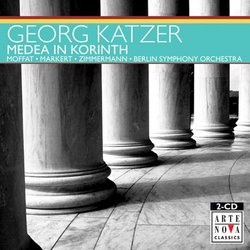| All Artists: Georg Katzer, Achim Zimmermann, Berlin Symphony Orchestra, Julie Moffat, Robert Künzli Title: Katzer: Medea in Korinth Members Wishing: 0 Total Copies: 0 Label: Arte Nova Classics Original Release Date: 1/1/2006 Re-Release Date: 8/8/2006 Genre: Classical Style: Opera & Classical Vocal Number of Discs: 1 SwapaCD Credits: 1 UPC: 723721233556 |
Search - Georg Katzer, Achim Zimmermann, Berlin Symphony Orchestra :: Katzer: Medea in Korinth
 | Georg Katzer, Achim Zimmermann, Berlin Symphony Orchestra Katzer: Medea in Korinth Genre: Classical
Medea is one of the most fascinating yet contradictory characters of Greek mythology. Medea, the daughter of Hekate and niece of Circe, was considered a famous magician who took lives and then spread them anew, presiding ... more » |
Larger Image |
CD Details
Synopsis
Album Description
Medea is one of the most fascinating yet contradictory characters of Greek mythology. Medea, the daughter of Hekate and niece of Circe, was considered a famous magician who took lives and then spread them anew, presiding over celestial growth and death. The legend of her as a killer of children developed much later. Christa & Gerhard Wolf?s libretto for Georg Katzer?s composition is based on the novel Medea ? A Modern Retelling, published by Christa Wolf in 1995. Medea in Corinth shows typical parameters of an oratorio. However, Katzer forgoes the recitative, for example, that takes on the narrative function of the oratorio. The arias, duets, chorales, and fugues near the end of the sections are not part of Medea. Only at the very end, the chorus leaves its acting role, citing a choral intonation and thus entering the role of a reflecting chorus. For those reasons, Georg Katzer does not consider his composition an oratorio but "oratorical scenes". Born in 1! 935 in Silesia, Georg Katzer was a master composition student of Hanns Eisler at the Akademie der Künste of the German Democratic Republic. In 1982, he founded the Studio for Electroacoustic Music there. Since 1963, he has been working as a freelance composer in and around Berlin. Born in 1929, German writer Christa Wolf worked for years as an editor, but has been a freelance writer since 1962. Her novel Medea ? A Modern Retelling was published in 1996 in Munich.

 Track Listings (11) - Disc #1
Track Listings (11) - Disc #1